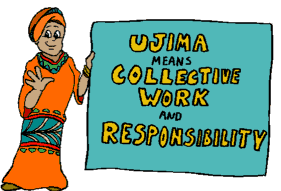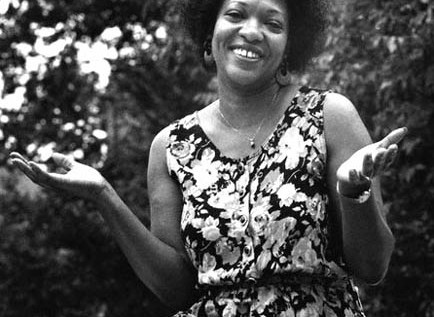On The Third Day Of Kwanzaa: Ujima (Collective Work and Responsibility)

UJIMA – to build and maintain our community together and make our sisters’ and brothers’ problems our problems to solve them together!
Ujima/Collective Work and Responsibility: “Commitment, duty, and obligation to work together with others to solve our family and community problems together and engage in collective projects that will advance the well-being of the family, neighborhood, and the common good.”
Ujima Theme: “Be Watchful over Each Other”
Today is the third day of Kwanzaa. Family (and friends) come together to celebrate the Ujima principle. To be sure, this principle cultivates the greatest sense and practice of empathy. Being empathic is not just an emotional feeling, but a critical component of our humanity. The African maxim give voice to this notion: “A human needs help.” The “imperative here is to act because our families and people deserve t be helped. This notion is “born of an acute sense of the essential dependency of the human condition.” The African proverb underscores the concept and value of interdependency reasoning: “A human being is not a palm tree as to be self-sufficient.” Humans, therefore, at all times directly or indirectly, need the help of others. The story of Akeelah and the Bee is portrait of the effectiveness of the Ujima principle.
The Story Akeelah and the Bee
The book and movie, Akeelah and the Bee, is a potent example of the Ujima principle. It tell a beautiful story of 11 year old Akeelah Anderson who lives in South Los Angeles. Akeelah is a gifted student who must overcome personal challenges and those within her community in order to make her way to the National Spelling Bee. Akeelah soon discovers the Spelling Bee circuit is a highly competitive. The Spelling Bee isn’t a game – it’s a challenging contest requiring students to know Latin and Greek. Students have to know the origin of words and their definitions. Many of the entrants have returned year after year in search of the elusive Spelling Bee Championship. In addition, many of the students are coached privately by parents, participate in spelling groups, move in the same social circles (such as birthday parties) and have strong financial/emotional support systems.
After seeing Akeelah discouraged by the competitiveness at the national level, Akeelah’s mother helps Akeelah with her spelling and points out Akeelah has “50,000 coaches in the neighborhood if she would just look around.” Akeelah discovers her mother’s statement about 50,000 coaches in the neighborhood is true. The entire neighborhood lends support. The men at the local gathering place begin to watch Akeelah on TV and cheer Akeelah on! Even the local drug lord insist Akeelah’s brother help her win the Bee. Akeelah goes on to win the National Spelling Bee Contest.
Ingathering Activity: Today we come together as family to talk about the principle Ujima and how we have observed this principle in practice throughout the year. As with the previous principles, the family engages in an enjoyable conversation around the practice of this principle, beginning in the family and spreading outward. This principle, like Umoja and Ujamaa is a multiplier. That is to say, it exponentially impacts the other principles.
Remembrance Activity: Like the previous days, families may in various ways raise the names of love ones who have passed on. In speaking their names and talking about their deeds, service, and accomplishment, we evoke their spiritual presence and ensure that they will live on forever.
Libation: Optional
Candle Lighting Activity: On the third day of Kwanzaa the family lights the green candle. This candle is symbolic of hope and future. The placement and order of the Kwanzaa candles teach and reinforce valuable lessons for the family. The lesson here is that we light the green candle to reinforce the value and priority we place our future.
Assessment and Commitment: Family members take inventory and discuss what efforts they have made toward keeping Ujima commitment and recommit themselves to the practice of this principle in 2013.
Kwanzaa Journal (Optional): Record you Ujima commitment in your journal
Karamu (Feast) and Celebration: Enjoy yourself and the delicious food; this is time for celebrate the joy of living, love among family and friends and the achievement of which have been attained throughout the year.
Note: Gifts may be given on any of the seven days of Kwanzaa.
Tags:
Acute SenseAfrican ProverbAkeelah And The BeeAkeelah AndersonBeautiful StoryCollective ProjectsCollective WorkCritical ComponentEmpathicFamily NeighborhoodGifted StudentGreek StudentsKwanzaaNational Spelling BeeOrigin Of WordsPalm TreePersonal ChallengesPotent ExampleSisters And BrothersThird Day 




